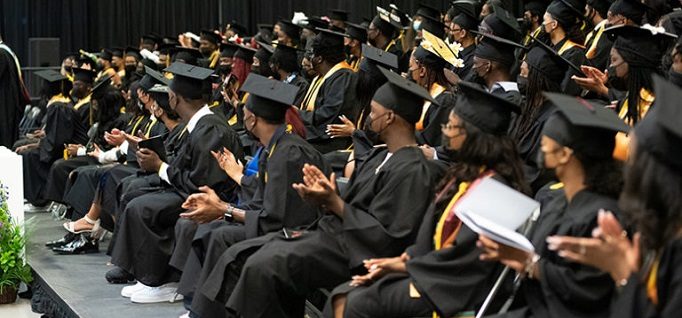Early college program helps all parties
By Joan Mooney
July 28, 2021
A K-12/community college partnership gives students a debt-free college education
When New Heights Charter School of Brockton (Massachusetts) came to Massasoit Community College about setting up a partnership a few years ago, officials at the college were delighted.
“We’d been investing in early college for over 14 years,” said Massasoit Provost Deanna Yameen. “At New Heights, every student would be college-ready – period.”
In May, 46 students – more than half the senior class – at New Heights graduated with an Associate in Arts – Liberal Arts Transfer degree from Massasoit. The degree will allow them to transfer to many colleges and universities as juniors.
That’s no small achievement for a public school in Brockton, where 80% of students are from low-income families, according to Omari Walker, New Heights executive director and founder.
“There weren’t many people when we first started who were willing to partner with us,” Walker said. “They thought, there’s no way this small group of urban kids could ever be college-ready.
“But Massasoit, from the beginning – and Deanna was instrumental – said, ‘Your kids can do this, we want to work with them.’”
Everyone was motivated to make the program succeed. It starts with New Heights, which gives students a great deal of support, both emotional and academic.
Other than residential requirements, “admission is 100% lottery-based,” Walker said. “So we are blind in who we accept.”
Fifteen percent of students speak English as a second language, and 98% are Black or Brown, he said. The majority are from low-income households.
Everyone goes to college
“We tell them from the day they enter, they’re college material,” Walker said. “Every single one of them goes to college, even if they have a learning disability.”
New Heights uses two placement tests, Accuplacer and ALEKS (Assessment and Learning in Knowledge Spaces), to assess students’ current abilities. For instance, the math portion can tell the school whether a student tests into Statistics, Algebra I or Pre-Calculus.
By the end of their second year, 33 out of 40 ninth and tenth graders tested into college classes, Walker said. The Massasoit dean stopped the New Heights bus on the way to the college campus and had lunch with them to find out how they did that.
New Heights students take two math classes a day, Algebra I and a math lab where they use a computer and lessons through a headphone, progressing at their own speed.
“They could go beyond what was happening in the classroom,” Walker said. “One sixth-grader at Christmas time tested into Calculus. He went into college Algebra as a sixth-grader. As a seventh-grader, he’s a full-time college student.”
Provost Yameen appreciates that New Heights is willing to build its curriculum with Massasoit so it meshes with the college courses.
“They teach our developmental courses – reading, writing math courses that don’t carry college-level credit,” she said. “They use our curriculum, our assessments.”
Blending on campus
When New Heights students come to the Massasoit campus, no one knows they’re not regular Massasoit students, Yameen said.
“They have the same rights as every Massasoit student,” she said.
William Kimani, a rising senior at New Heights, took all his classes at Massasoit when he was in tenth grade.
“I loved it,” Kimani said. “I joined the business club, I used the library often.
“The free tutoring available on campus helped out immensely,” he said. “At Massasoit, I was more supported than I would have been at a regular high school.”
Kimani used the Massasoit library to learn how to research papers and tapped the college’s Academic Resource Center for help going over his papers and math problems. He appreciated being able to meet with professors in their office hours.
Working in sync
The two schools work together closely.
“We are written into their charter,” Yameen said. “We went multiple times during the year to talk to them about the curriculum.”
A team from both schools meets at least once a month to discuss whether any changes are needed. There have been several since the program started five years ago. One example:
“Once students came in, we decided we don’t want to give students so many heavy reading loads when they already have a lot for their high school classes,” Yameen said. “So we had an interim acting class where they act out scenes.”
Massasoit administrators also learned they had to move faster in math for the Massasoit students, many of whom excelled in that area.
During the Covid lockdown, classes at Massasoit were remote for all students, including those from New Heights.
“It was kind of like hitting a wall,” said Kimani, who spent his junior year taking Massasoit classes online. “It did hurt, but eventually you get the swing of it.”
Yameen gave a more positive assessment.
“What I’ve heard from our faculty is that New Heights students have fewer issues than the rest of the students,” she said. “We’ve built in so much support for New Heights students. [The professors] know those students as individuals. They’re educated to be independent.”
And they are motivated to do well at Massasoit so they can get graduate from high school with an associate degree, paid for by the state of Massachusetts.
There’s more to the story! Read the full article in CC Daily.



